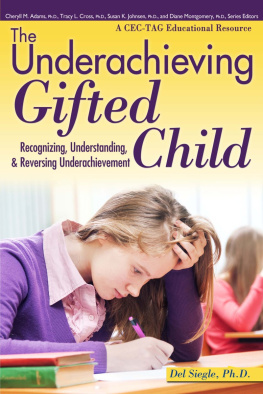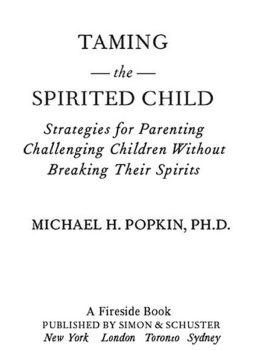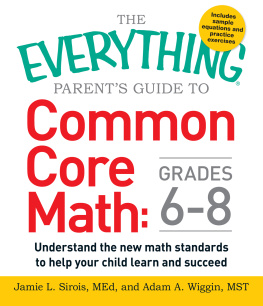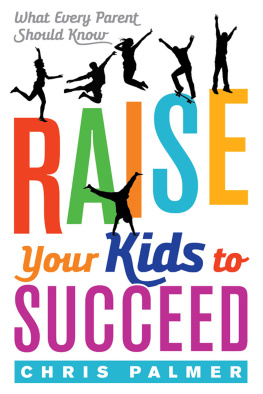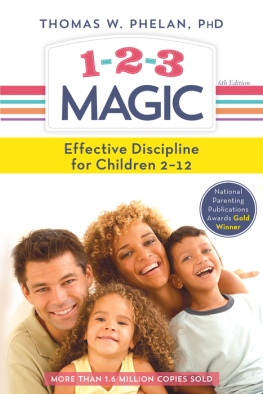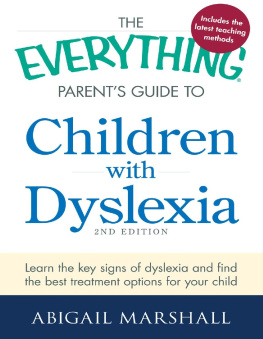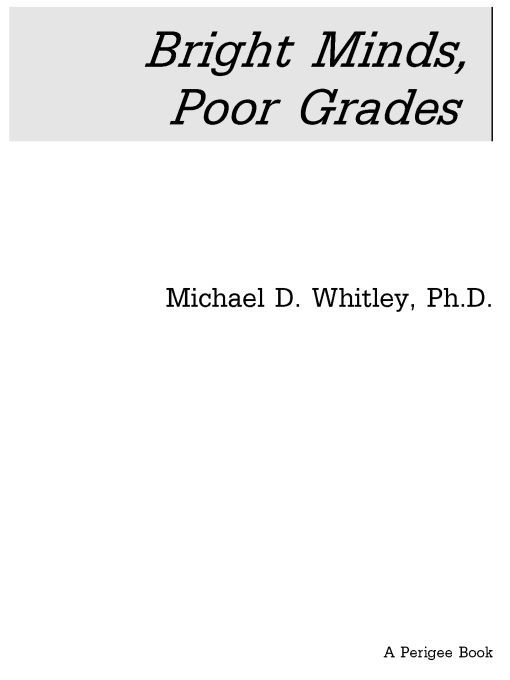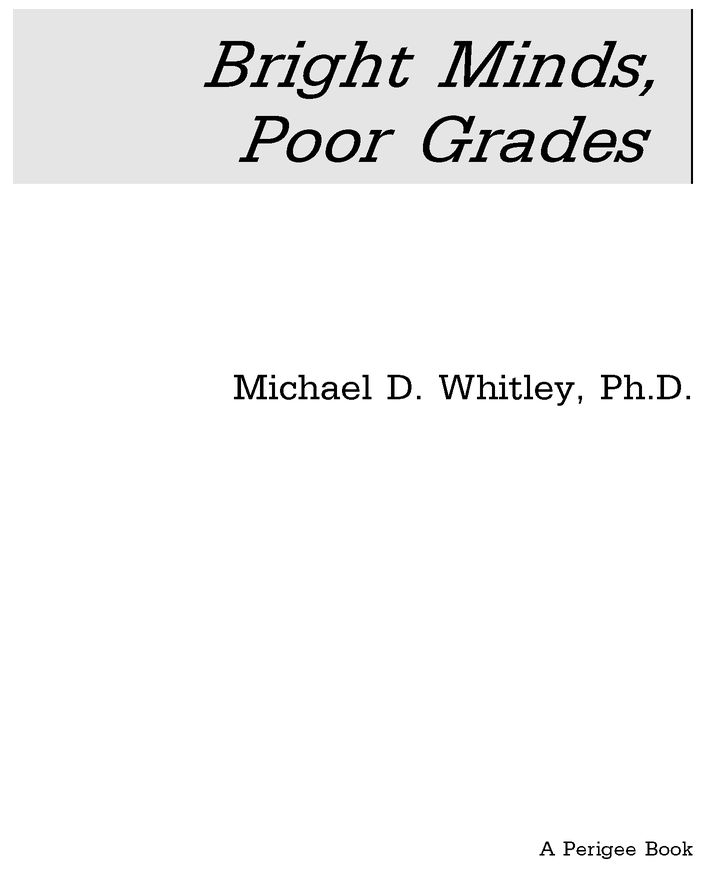Table of Contents
Most Perigee Books are available at special quantity discounts for bulk purchases for sales promotions, premiums, fund-raising or educational use. Special books, or book excerpts, can also be created to fit specific needs.
For details, write: Special Markets, The Berkley Publishing Group, 375 Hudson Street, New York, New York 10014.
To Marilyn and my children
Todd, Katharine, and Allison
Introduction
Parents: What is wrong when your capable child brings home more bad grades and more poor report cards? He is intelligent enough to do better, but he consistently underachieves due to a lack of responsibility, excuses for failures, and a lack of motivation and effort to achieve. He seems lazy and disinterested in success and nothing seems to help. Year after year he is not growing out of it, and may even be getting worse. He seems to be a good kid, but he does not follow through on his promises to do better next time, and astonishingly, he even rejects a helping hand when he needs it the most. What is wrong here?
Your child may be an underachiever. If you knew what caused him to make poor grades and fail to reach his potential, maybe you could be a more effective parent, and maybe, your child could learn to be more motivated and successful. As it stands now, he is simply closing doors to his future. And he may not even be interested in discussing his future seriously.
Over the years in my work, I have seen parents become frustrated, angry, and discouraged by their bright but underachieving children. Ive seen parents resent and worry over their underachieving childrens deceptions, lies, manipulations, and work themselves to exhaustion trying to motivate their children to become successful. I have seen parents try one home remedy after another, from tutoring to power tactics, groundings and punishments, lectures and pleading, and even leaving kids alone to suffer failures on their own... to no avail. Sometimes, an inspired parent will spark the fires of motivation in their children, only to see the promise of sustained success flicker briefly in the dark and then be snuffed out. I have seen bewildered and angry parents demand why? and get for their trouble only a shrug of their childrens shoulders and a vacuously inadequate I dont know for an answer.
Bright children who fail or underachieve in school are a sad puzzle. Parents try to motivate them but nothing seems to help. When they reach the teenage years, from seventh grade onward, many adolescent underachievers begin to have other problems. Family conflicts and tensions escalate and depression and low self-esteem set in and some children turn to drugs, alcohol, or promiscuity to escape the cumulative pain of their failures. They substitute pleasure seeking for their lack of independence, confidence, and the deep pride that comes from successful work. Through these years of struggle from childhood to adolescence, parents begin to worry. Time slips by and a quietly disparate thought gnaws remorselessly at the heart: A long pattern of self-defeat is emerging that will rob my child of happiness. My child defeats himself in school, how will he be able to get along in life later on? Will he defeat himself then as he does now? Is there nothing I can do to help?
Why do bright kids underachieve or get into trouble? The answers are to be sought in their deepest values.
Basic human values are involved in the problems of success and underachievement. These values are too important to quality of life and even the continued prosperity of our country to be ignored or treated by trivial and ultimately impotent success techniques that promise quick, magical cures for long-term problems. These quality-of-life values are the foundation of character, and without them sustained success in work and family is impossible. These character values involve such old-fashioned but irreplaceable virtues as self-discipline, commitment to goals, the ability to sacrifice momentary pleasures for the greater rewards of tomorrow, independence in motivation, moral responsibility, cooperative effort, trust, the capacity to govern oneself, and an abiding commitment to family and the development of ones own talent. Students who sustain achievement in school almost always reflect these old-fashioned values in their behavior. Underachieving students who have brains but lack effort almost always reflect a lack of these old-fashioned virtues in their behavior. Because their efforts miss these virtues, underachievers almost always suffer from a lack of emotional meaning in life. They lose the power and pleasures work could bring to them.
The true emotional power of work is to make life meaningful for the individual and his community. With the right attitudes and commitments, work can transform individuals and bring joy to life. The recognition of the importance and power of work stretches deeply into the historical and spiritual roots of our civilization. In the Bible, for example, the ability to love and work plays a crucial role in the development of a worthwhile life. Loss of the capacity to love labor leaves individuals in such despair that one Biblical author admonishes his readers that, Whatsoever thy hand findeth to do, do it with all thy might, and There is nothing better for a man than that he would eat and drink, and that he should make his soul enjoy good in his labour. (Ecclesiastes 9:10 and Ecclesiastes 2:24).
It is not merely an accident of language that the author of Ecclesiastes makes the verb enjoy into an act of trained will. If we do not make our hearts enjoy the tasks before us, then it is no one elses responsibility to bring us enjoyment in our work. Achievers are usually able to wring some pleasure out of even the most tedious of tasks. It is sadly a fact of experience that underachievers almost always find ways to resent and hate having to do work. When they do work, it is usually only when the mood strikes. If they have an especially entertaining teacher, or if they happen to like what they are learning, they work, but only until their feelings change... then they fail once more. There is a passivity in their approach to life and work. They do not, indeed, they believe they cannot, learn to control their own feelings to find a way to make their soul enjoy the good in their labor. Something must motivate them from the outside, must push or pull them to achieve. On their own they fail. Their potential festers like an old, unhealed, self-inflicted wound that they refuse to see they have the ultimate power to heal.
There is nothing better a parent can do than to teach his children how to develop that inner will to succeed, to connect enjoyment and positive feelings to tasks, to learn to work with all their might, and learn to motivate themselves from within. If children are always waiting for something magic to happen to them before they learn how to work, then they will likely waste their time waiting around for something to happen, hoping someone, somewhere, will do something vital for them. This is the hope of a wasted life.
Emotionally healthy individuals have two great powers at their disposal: these are the power to love and the power to work. All underachievers lack emotional health when it comes to work. They cannot consistently perform work. If children cannot learn to work, then they will eventually suffer from other problems as well, such as depression, anxiety, unhealthy dependency on others, and finding substitutes for a meaningful life such as substance abuse and promiscuity, all of which lead children to a sense of victimhood and boredom that is so prevalent in our country today.


